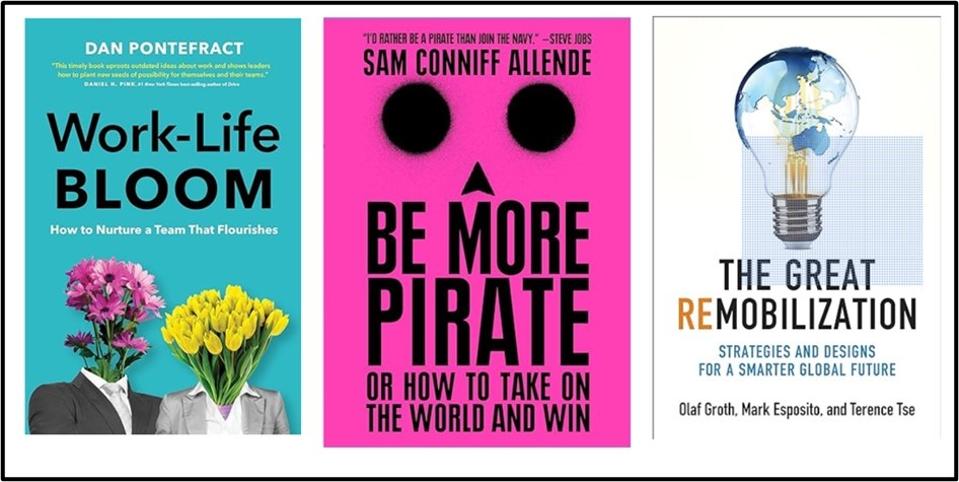“We need a resilience that is forward-looking—that is fundamentally creative,” Drucker Forum announced in the abstract by Julia Kirby, “Creative Resilience: Leading In An Age of Discontinuity.” It continued: “But in joining Schumpeter’s call for creative dynamism we are also optimistic that organizations need not be destroyed in the process…A well-led enterprise can learn to survive deep blows and still surge forward.”
The Drucker Forum blog offers a variety of responses to its call for action, all of them optimistic, but each in its own way.
Some of the essays focus on specific areas of action. Thus, Sam Conniff, author of Be More Pirate (Atria Books, 2018), argues that “Uncertainty Tolerance’ should be your focus in an uncertain future.” He writes that “it is possible and simple to train teams to transition from asking, ‘What’s the worst that can happen?’ to considering, ’What’s the best that can happen?’”
Abhishek Banerjee, winner of the Drucker Challenge Essay Award 2023: Student Category, in his article, “The Underdogs enabling India’s Economic Recovery” explains how “India made a strong post-pandemic recovery, leapfrogging the UK to become the fifth largest economy in the world. The essay delves into the role that Self-Help Groups played in achieving this remarkable turn-around.
Professor Yoshikuni Takashige, former Chief Strategist of Fujitsu, argues in his article, “Human-Centric Art of Storytelling,” considers the role of AI and argues that “storytelling is the human-centric art of improvised dancing with your audience. Only when your story is experienced in your audience’s mind and body, meanings will be fully unfolded… Thinking about ‘what AI can do’ leads us to revisiting ‘what we humans are’. There are many pathways to consider this question. But … we are a unique existence that lives by creating and communicating stories.”
Dan Pontefract author of Work-Life Bloom (Figure 1 Publishing, 2023) in his article “Creativity Encourages Resilience” argues that “culture and strategy must become integrated components if it wishes to be more creative. But we must allow more time to be explorers than being exploited… It necessitates senior leaders acknowledging the intricate relationship between creativity, time, and the human desire for exploration—even within professional confines.”
Bradley Andrews, the 2023 winner of the Drucker Challenge 2023: Manager/Entrepreneur Category, in his article “Prescience in the Modern World,” addresses the possibility of a more subversive and exciting kind of resilience that is not only “agile in the means it uses to achieve its end, but revolutionary about the ends themselves.”
“Many of us,” Andrews writes, “are already in the penumbra of this phenomenon. Customers want their brands to provide good products, but also to be sustainable, racially-conscious, vocal about climate change, ethically sourced… Pursuit of these causes often compete with the classic goal of companies, such as making a high profit and reducing overhead. Companies may not have to advocate for any of these causes specifically, but companies must be able to integrate additions to their business goals, even if the additions seem superficially contradictory. More importantly, they have to do it authentically and not as mere virtue signals.”
Mark Esposito, co-author of The Great Remobilization (MIT Press, October 2023) takes this idea further and spells out the implications. In his article, “Embracing a Human Centric Economy,” he suggests that Pontefract’s “professional confines” themselves need to change. He embraces “a paradigm shift for a better future… a shift towards a more human-centric economy that prioritizes people’s well-being and fulfillment over pure economic growth. Human-centric creativity, driven by empathy and understanding, can lead to innovative solutions that address economic and societal challenges. It encourages us to consider long-term implications and prioritize the enhancement of the human experience alongside technological progress.”
“In this paradigm shift, business leaders hold a unique position of influence. They can become torchbearers of change by fostering corporate cultures that prioritize the mental and emotional well-being of their workforce…Unleashing creativity aimed at building resilience begins by fostering an environment that encourages experimentation and innovation.”
The articles all reflect the thought there is no single answer to the challenge of achieving creative resilience. Organizations are multi-dimensional ecosystems (or complex adaptive systems) that don’t operate by predictable, linear, cause-and-effect changes. Understanding the complex nature of organizations is a necessary step towards achieving creative resilience.
And read also:

